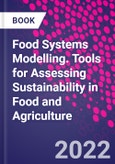Food Systems Modelling emphasizes sustainability, including the impact of agriculture and food production on profits, people and environment, with a particular focus on the ability of humanity to continue producing food in the midst of global environmental change. Sections introduce the purpose of models, the definition of a food system, the importance of disciplinary, interdisciplinary, and transdisciplinary inquiry, cover specific branches of modeling in the sustainability of food systems, and wrestle with the challenge of communicating modeling research and appropriately integrating multiple dimensions of sustainability.
This book will be a welcomed reference for food scientists, agricultural scientists, nutritionists, environmental scientists, ecologists, economists, those working in agribusiness and food supply chain management, community and public health, and urban and regional planning, as well as academicians and graduate students interested in the sustainability of food systems.
Please Note: This is an On Demand product, delivery may take up to 11 working days after payment has been received.
Table of Contents
1. Introduction Using models to study food systems2. The origins, definitions and differences among concepts that underlie food systems modeling
3. Life cycle assessment of foods and diets
4. Water Footprint Assessment: towards water-wise food systems
5. Land use modelling from farm to food systems
6. Foodshed analysis and carrying capacity estimation
7. Market and Supply Chain Models for Analysis of Food Systems
8. Framing and evaluating the economic impacts of food system policies, programs and initiatives
9. Environmental Input-Output (EIO) Models for Food Systems Research: Application and Extensions
10. Modeling biophysical and socioeconomic interactions in food systems with the International Model for Policy Analysis of Agricultural Commodities and Trade (IMPACT)
11. Using Social Network Analysis to Understand and Enhance Local and Regional Food Systems
12. Participatory modeling of the food system: The case of community-based systems dynamics
13. Using models to understand community interventions for improving public health and food systems
14. Applying environmental models in the food business context
15. Inquiry within, between, and beyond disciplines
16. Conclusion: Towards a holistic understanding of food systems








